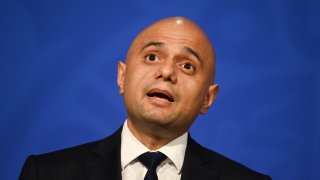
- Health Minister Sajid Javid announced Wednesday that in order to minimize disruption and "following expert clinical advice," those who receive a negative lateral flow result on days six and seven of their quarantine period will be allowed to leave isolation.
- The U.K. is currently battling a surge in cases of the highly transmissible omicron variant, with fears mounting that health services could be overwhelmed, and economic activity dented.
LONDON — The British government has shortened the mandatory Covid-19 self-isolation period in England from 10 days to seven days for those who get negative lateral flow tests on two consecutive days.
Health Minister Sajid Javid announced Wednesday that in order to minimize disruption and "following expert clinical advice," those who receive a negative lateral flow result on days six and seven of their quarantine period will be allowed to leave isolation.
The U.K. is currently battling a surge in cases of the highly transmissible omicron variant, with fears mounting that health services could be overwhelmed, and economic activity dented.
Get South Florida local news, weather forecasts and entertainment stories to your inbox. Sign up for NBC South Florida newsletters.
So far, the British government has resisted emulating a number of countries in mainland Europe that have imposed strict containment measures over the holiday period.
The mandatory isolation period was cut from 14 days to 10 days in late 2020 as the alpha variant spread rapidly in various regions of the U.K., and the quarantine requirement for vaccinated close contacts of positive cases was dropped during the delta wave earlier this year.
Money Report
Irene Petersen, professor of epidemiology and health informatics at University College London, told CNBC on Wednesday that shortening the isolation period was a good move, since most people are not infectious beyond day seven, and the requirement for consecutive negative tests will catch most anomalies.
"I have been looking a little bit on the sensitivity of that, and if you say a single test has a sensitivity of around 90%, if you combine the sensitivity of the two tests, you are up at 99%, and that means we will have few who would be false negative," she said.
"Also taking into consideration that we only have, let's say 10% are still infectious at that time, it would be less than one in 1,000 people who would be false negative after that. So I think it is a sensible move right now to cut it to seven days."
Antiviral progress
The U.K. government also announced Wednesday that it had signed two contracts for a combined 4.25 million courses of Covid-19 antiviral pills.
Pfizer announced Wednesday that it will provide an additional 2.5 million doses of its COVID-19 pill Paxlovid to the country, with a total of 2.75 million due to be delivered throughout 2022.
The British government also ordered 1.75 million additional courses of Merck Sharp and Dohme's Lagevrio (molnupiravir) pill, with both options expected to be effective against omicron in reducing the risk of hospitalization and death in high-risk patients.
"This is a mammoth deal for the U.K. government and for patients across the country that are set to benefit from these antivirals over the coming months," Javid said in a statement Wednesday.
Molnupiravir is currently being rolled out in a national study called PANORAMIC, run by the University of Oxford in close collaboration with general practitioner hubs.
"If you're aged 50 and over or have an underlying health condition and test positive for Covid-19, sign up to the study as soon as you can and take advantage of this remarkable treatment," Javid added.






